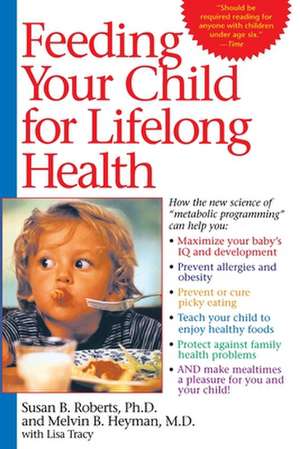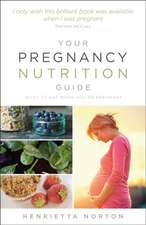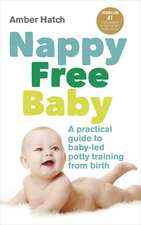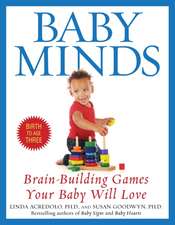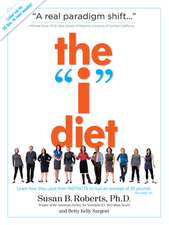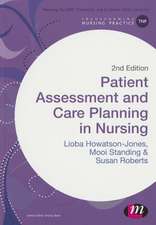Feeding Your Child for Lifelong Health: Birth Through Age Six
Autor Susan B. Roberts, Melvin B. Heyman Lisa Tracyen Limba Engleză Paperback – 31 iul 1999
Maximize your baby's IQ and development
Prevent allergies and obesity
Prevent or cure picky eating
Teach your child to enjoy healthy foods
Protect against family health problems
AND make mealtimes a pleasure for you and your child!
In this groundbreaking book, two leading pediatric nutritionists--and experienced parents!--introduce exciting new research into "metabolic programming" and make it accessible and practical for every busy parent. They explain:
How the foods you choose can optimize your baby's future development, IQ bone strength, and immunity
The eight key nutrients to focus on
Scientifically based "smart strategies" for working with your child's inborn instincts to build healthy eating habits
Food solutions for common problems--including colic, constipation, poor sleep, and hyperactivity
How to prevent or deal with food allergies or obesity
Easy ways to adapt family meals for kids--with menus and portion sizes for every stage from birth through age six, plus essential tips for food safety
What's more, you can teach your child to enjoy these healthy foods and banish food battles and picky eating forever.
Preț: 121.10 lei
Nou
23.18€ • 25.16$ • 19.47£
Carte disponibilă
Livrare economică 02-16 aprilie
Specificații
ISBN-10: 0553378929
Pagini: 372
Dimensiuni: 142 x 229 x 24 mm
Greutate: 0.55 kg
Editura: Bantam Books
Notă biografică
Melvin B. Heyman, M.D., M.P.H., is Professor of Pediatrics and Chief of the Division of Pediatric Gastroenterology, Hepatology and Nutrition at the University of California in San Francisco, where he directs an active clinical program. He also directs a research and training program focusing on nutritional treatment of acute and chronic diseases, childhood nutritional requirements, and food allergies.
Lisa Tracy is an editor with The Philadelphia Inquirer and the author of two previous nutrition books.
Extras
Chapter 1: Metabolic Programming--What It Is, and What It Can Do for Your Child
With her baby due in three weeks, a mother-to-be visited her local supermarket to buy some diapers and check out the baby food aisle. What an excitement-and a shock-it was. Those rows of jars, packets, and cans made impending motherhood seem so real! But she had thought she was ready to feed her baby, and here was a whole world of new decisions to make. She wouldn't be using formula at first, but which of the sixteen kinds (some costing three times as much as others) would be right for later? And would she need any of these other items? The pear juice in tiny bottles looked delicious, but wasn't her niece's tummy pain traced to an allergy to baby juice? Should fluoridated spring water go on the shopping list? And those jars of nutrient-packed spinach? Could she really get her baby to like something she hated? Should she even try?
This book began in that moment six years ago, when I was that excited and puzzled mother-to-be. As a nutrition researcher, I have spent twenty years studying the importance of healthy food at all stages of life. But it was only when I became a mother that I realized how much parents needed the information we were discovering. Studies from my own laboratory and others around the world had taught me that, contrary to the advice in the parenting books in my house, the foods my daughter would eat during the first months and years of life would have long-lasting-and in some cases permanent-effects. I knew that nutrition was not the whole story, of course. But it would make an important difference in virtually everything, from her mental and physical development to her vitality, personality, and health from childhood through old age. The way I behaved about her food would be critical, too, preventing difficult eating behavior in the short term and lifelong struggles with disorders such as obesity and anorexia. With this valuable knowledge as my guide, I began helping my daughter learn to enjoy the foods best for her development and health, a rewarding and joyful task that continues with her entry into kindergarten.
My first insight into the power of childhood food came some years ago when I worked with a research team in a village in West Africa. At first I was surprised to see no children who looked malnourished: They all seemed fine-and were extremely well behaved! It was only after I started studying them that I realized they were permanently stunted due to a lack of good food. Their quiet behavior stemmed not from superior discipline techniques (as I had first supposed) but from inadequate nutrition that left them without the vitality and exuberance of well-nourished children. Even worse, their lack of normal exploratory behavior was preventing them from learning all the things that children need to learn if they are not to be left behind in a fast-paced world.
Later, when my research moved to Cambridge University in England and subsequently to Tufts University in Boston, I realized that my observations in Africa were only the tip of the iceberg. Research from my laboratory and others was showing that even in affluent countries such as the United States, good childhood nutrition is not what many pediatricians and concerned parents currently think it is. Yet it can make the difference of a lifetime, conferring long-term, even permanent advantages in mental and physical development and health.
While my experience on three continents was teaching me about the importance of childhood nutrition, my partner in this book, pediatric gastroenterologist Dr. Melvin Heyman, was having similar revelations in his nutrition clinic at the University of California at San Francisco. Mel had also observed that poor childhood nutrition was not confined to families struggling to make ends meet. Affluent, well-educated families were also vulnerable, even to problems such as the nutritional stunting I had seen in Africa. This was obviously not for lack of money or even for lack of concern, but sometimes because the families were eating extremely low-fat, whole-food diets that were healthy for the parents but contained the wrong nutrients to allow for normal childhood growth.
Raising our own children and spending time with other families, we also saw that knowing what to feed your child is not enough. How children are fed is as important as what goes on the table-because food counts only if it's eaten! Children can often seem difficult when it comes to food, but there are actually good reasons why they think and behave the way they do-reasons grounded in the normal psychology and biological programming of childhood. By learning how to work with, rather than against, our children's natural instincts, we can reduce feeding conflicts while at the same time teaching a lifelong enjoyment of healthy foods.
Combining our insight into childhood psychology with the latest research on childhood nutrition, we saw we could point the way to a whole new approach to feeding children-one that would make parents' lives easier while ensuring that their children reach their full potential in development and health. This book was born out of our desire to share that knowledge with other parents and health professionals, and to give every child the benefits that an enjoyment of healthy foods can bring.
METABOLIC PROGRAMMING: THE POWER OF CHILDHOOD FEEDING
Behind the big eyes that scan your face and the tiny hand that grasps your finger, an event known as metabolic programming is unfolding in your child. Metabolic programming is the new term being used to describe the fact that foods eaten in childhood can have lasting effects on the way your child's body grows and functions.
How do foods consumed early in life exert effects beyond the short time they are physically present in your child's body? Scientists believe that metabolic programming happens in part because growth and cell division in many parts of the body occur only in childhood. During this time individual cells are sensitive to the availability of nutrients-in other words, the body's basic building materials.
We now know that each organ, tissue, and nerve cell within the body develops in its own unique window of time, in response to a complex set of biological signals arising from the body's DNA. The nutrients physically present at this crucial time for cell division and growth help determine which cell types become predominant within each tissue. The same nutrients also influence how large or small each cell within the different body components ultimately becomes, and how efficiently and well it functions in the future. And because organ and tissue functions determine such essential body processes as hormone production and enzyme activity, alterations in normal development can have far-reaching effects. Once the cells' period of sensitivity to growth signals has passed, the function of each individual cell is largely fixed. In other words, it has been metabolically programmed by the food your baby, toddler, or preschooler was eating during that cell's growth spurt.
Six Myths About Feeding Children
Myth: Left to his own devices, your child will select a nutritionally balanced diet.
Reality: Parents need to help their children learn to enjoy foods that promote long-term development and health.
Myth: What is healthy for you is healthy for your child.
Reality: Children are not small adults when it comes to food. Although they can eat many of the same foods you do, the proportion needs to be quite different to ensure that their very different nutritional needs are adequately met. Higher needs for fat and lower needs for fiber are just two of the many ways your child's nutritional requirements differ from yours.
Myth: Colic can't be treated by changing what your baby eats.
Reality: As many as 25 percent of colic cases can be improved or even cured by changing a baby's diet. This is true even for breast-fed babies, when it is the mother who makes the dietary changes.
Myth: Children need many more calories, pound for pound, than adults.
Reality: Children do need more calories than adults when their small size is taken into account, but actual caloric needs are much less than the current RDAs--which have recently been described as "a prescription for overfeeding."
Myth: If you delay weaning onto solid foods, you will prevent your child from becoming overweight.
Reality: Late weaning can actually compound a tendency to gain too much weight.
Myth: Vitamin supplements are not needed by children gaining weight normally.
Reality: Weight and height are only two indicators of healthy growth. More than 50 percent of American children under the age of three years do not get the recommended amounts of for several essential nutrients without a daily multivitamin/mineral supplement.
Recenzii
--Christine Gorman, Time magazine
"A very intelligent approach to the feeding of young children."
--T. Berry Brazelton, M.D., author of Touchpoints
"At last a book that not only tells parents what their children need to eat but provides a realistic and reassuring approach to how to feed them. This is a book every parent will want to have on their bedside--or kitchen--table."
--Annie Pleschette Murphy, Editor-at-Large, Parents magazine
"I have not seen another publication anywhere in the world that addresses this field in such a way. This book is truly brilliant...meticulously anchored in the science of nutrition, infant and young child behavior and development, and completely up-to-date. It is also full of warm, humanely written practical applications and guidance....An excellent guide for pregnant mothers, parents, health workers, nutritionists, nurses, physicians, and pediatricians."
--Graeme A. Clugston, M.B., Ph.D., Director, Nutrition for Health and Development, World Health Organization
"Heart disease begins in childhood--and so does a healthy way of eating. Feeding Your Child for Lifelong Health shows why it's never too early--or too late--to discover the power and joy of healthy nutrition. This book may save your child's life."
--Dean Ornish, M.D., author of Love & Survival and Dr. Dean Ornish's Program for Reversing Heart Disease
"This book deserves to be read by every pregnant woman across America. It is a relief to find such evenhanded treatment of many controversial issues that trouble new parents and the practical, clearheaded guidance for every stage between birth and six years."
--Barbara J. Moore, Ph.D., President and Chief Executive Officer, Shape Up America!
"A 'how-to' with the science to back it up, this comprehensive, innovative book is a godsend to those who want children to be healthy and appropriately nourished, through each developmental stage."
--M. Edward Keenan, M.D., Past President, American Academy of Pediatrics
Textul de pe ultima copertă
In this groundbreaking book, two leading pediatric nutritionists -- and experienced parents! -- introduce the exciting new research into "metabolic programming" and make it accessible and practical for every busy parent. They explain:
-- Why some of today's food rules for adults can actually harm young children
-- The eight key nutrients to focus on (the rest will take care of themselves)
-- Scientifically based "smart strategies" for working with your child's inborn instincts to build healthy eating habits
-- Food solutions for common problems -- including colic, constipation, poor sleep, and hyperactivity
-- How to prevent or deal with allergies, food intolerance, and obesity
-- Easy ways to adapt family meals for kids -- with menus and portion sizes for every stage from birth through age six, plus essential tips for food safety
Complete, authoritative, and filled with answers to parents' most-asked questions, Feeding Your Child for Lifelong Health is the one book you need to do the best for your child.
